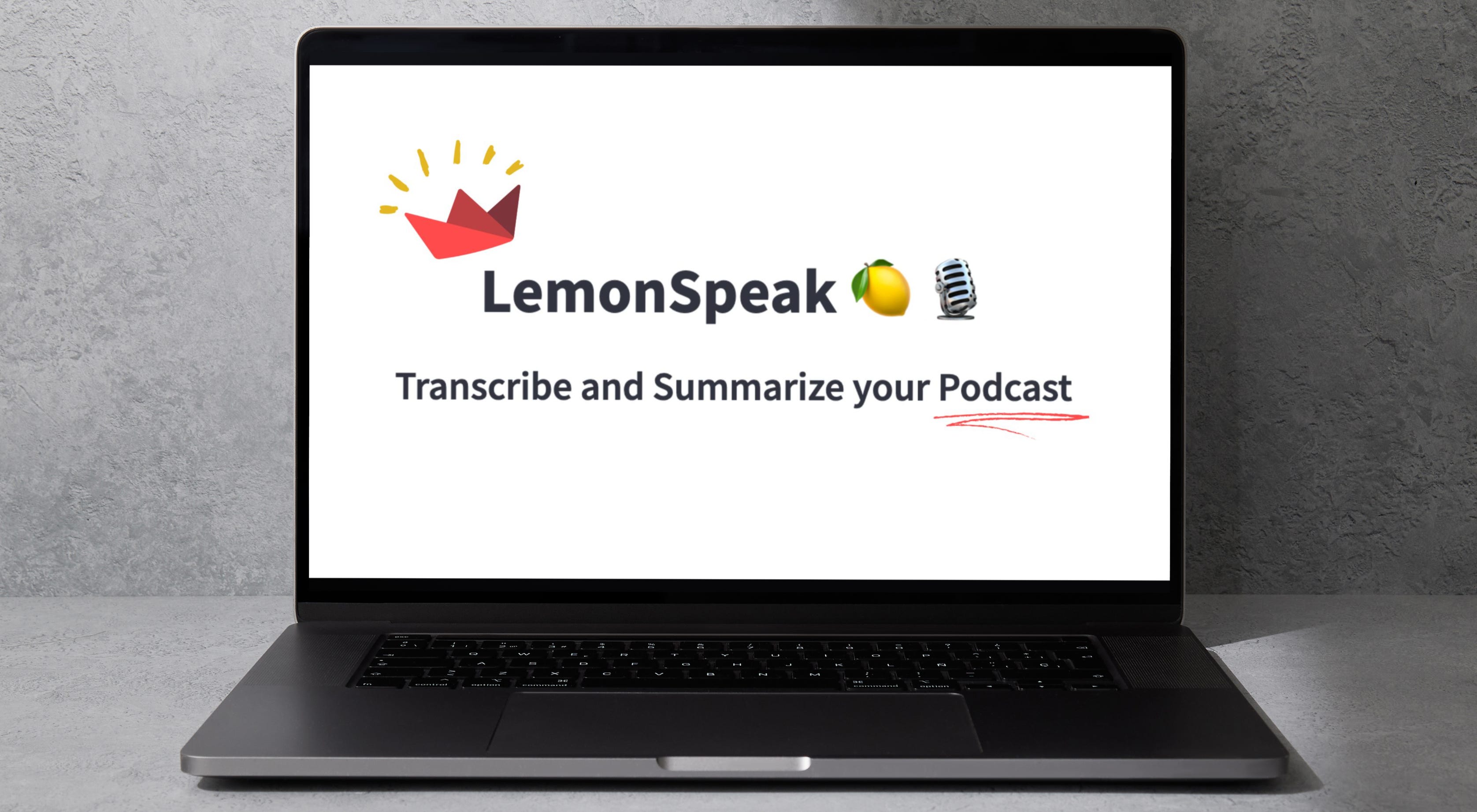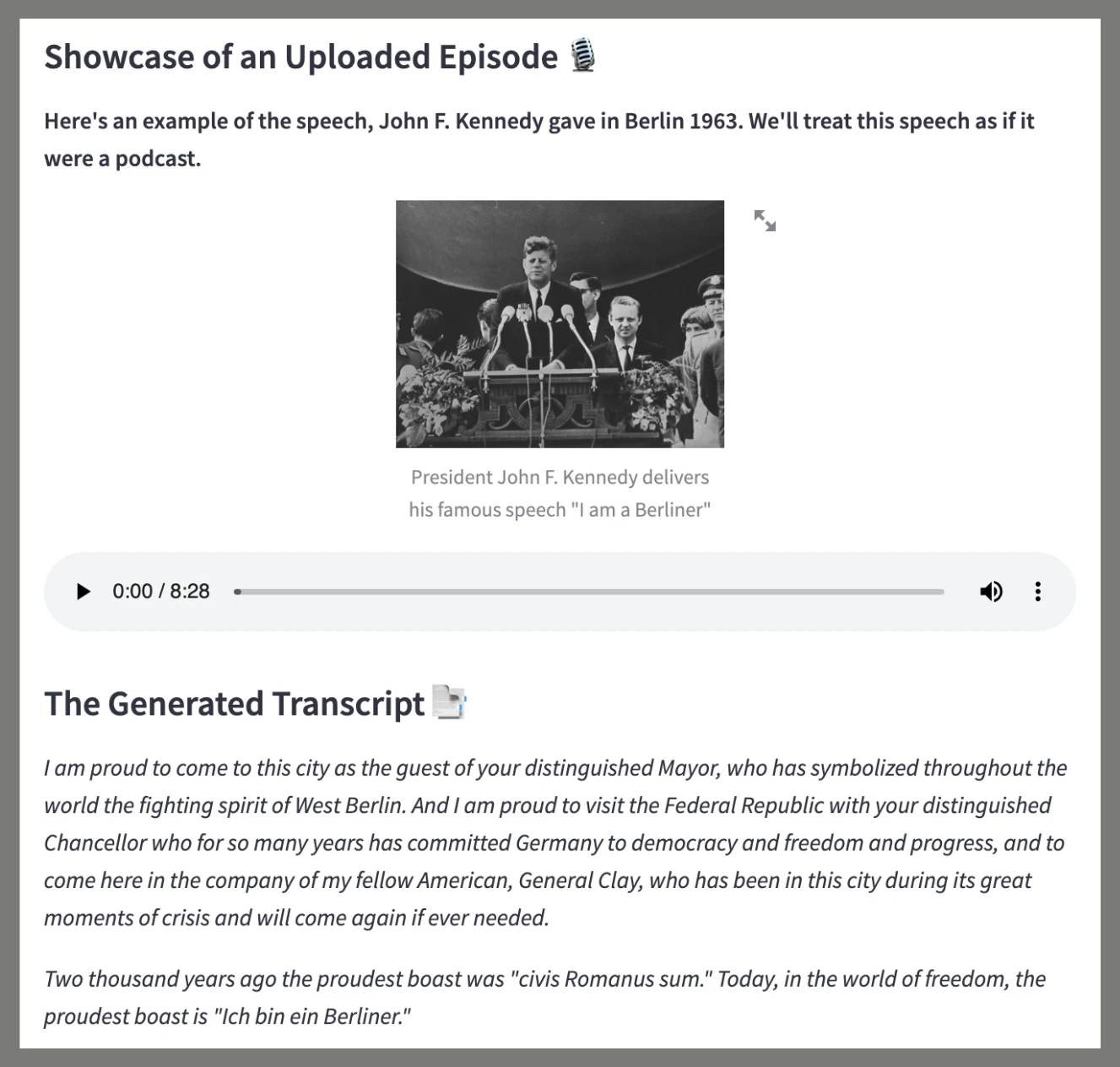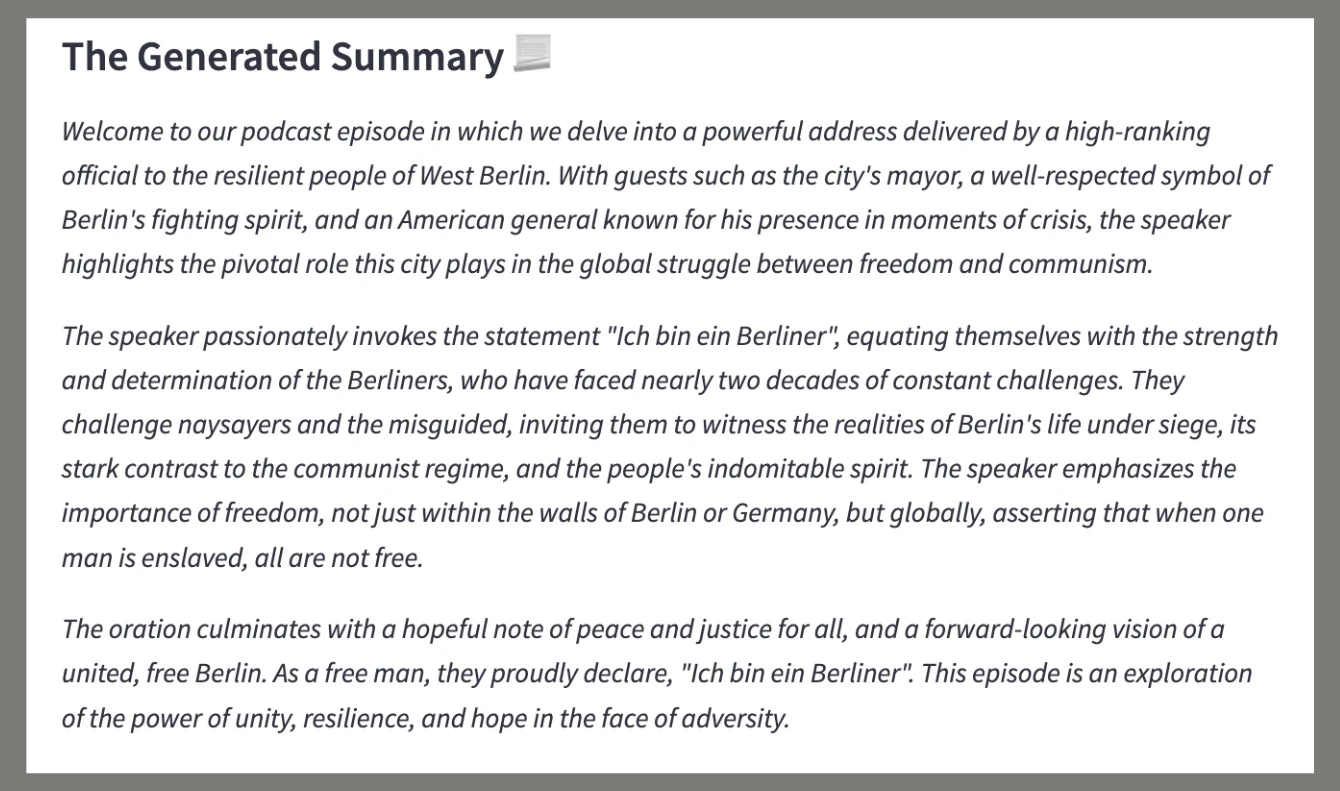
How to Get a Transcript of a Podcast: Our Podcast Transcript Generator
05.07.2023
Last week, I introduced a tool called Podcast Grader. 🎧 This free Streamlit app lets you upload a recorded episode of your podcast, grades the audio quality of the file against four metrics, and pinpoints areas that need additional attention in your editorial process 👀🚨. This ensures high-quality and a balanced listening experience for your users. 😌
🔗 Discover LemonSpeak 🍋🗣️

This week I’ll introduce you to the second publicly developed app in a series. You can find the app here: LemonSpeak
The Benefits of a Podcast Transcript 📝🆙

Screenshot of the generated transcript of John F. Kennedy’s speech in Berlin
Podcast Grader positions itself before you publish the episode. Now, let’s shift focus to post-release. Remember one of the first episodes you published? It was a lot of work and perhaps not many people tuned in. If you’re not a viral unicorn in the podcast space, growth tends to be linear, requiring time and consistency. ⏱️🔄 However, these are not all variables of the equation. Social media and SEO-friendly content can significantly boost your podcast’s visibility. 👀💻
SEO means Search Engine Optimization and is basically a term we use to talk about how well you can be found on the Internet. Some content may not be optimized for search engines, resulting in fewer people finding it.📉👇
Consider this scenario: you have a website for your podcast, which, in itself, is a significant step given that the majority of podcasters do not. You list your episodes on your website, allowing users to listen directly - another great move!
You’re drawing users to your site, which gives you leverage to do more on your site. Are you launching a merch or linking to your Patreon? That’s much easier to do from your website. But what if you don’t get many visitors? You’ve put so much work into producing your podcast. Let’s take the perspective of the search engines and see where transcriptions come in!
Why Transcribe Podcasts? 🖼️📊
A search engine is good at reading text, whether plain text or code that may contain metatags 📖💻. The audio file of your episode cannot be read by the search engine. So none of the existing search engines know what is behind these files. They can read the title and the keywords you define, but the actual content, which is very powerful, remains hidden from the search engines.
This is exactly where LemonSpeak helps: With this tool you can easily create a podcast transcription that differentiates between speakers of your podcast and copy-paste them below the mp3 player on your website. By doing this, you give the search engine the ability to index your website based on the topic you talked about in your episode. Now you know why transcriptions are important to search engines. 🌐🔎
Not only does the search engine like transcriptions, but so do your users. They provide additional value to your users, giving them a reason to visit your website 💡👥. With a transcription, you make your podcast searchable and give listeners the opportunity to re-read a passage. It also makes the episode accessible to people who are hard of hearing or who want to learn a new language with your podcast and follow along with the transcript. You optimize two dimensions with this: Visibility for search engines, called SEO, and you provide additional content to your users. It’s a win-win! 🏆🚀
It’s important to address certain aspects of AI-driven transcriptions and diarizations. While they are handy and efficient, they are not 100% accurate, especially with complex language, multiple speakers, or poor audio quality (but that’s why we have Podcast Grader 😉🤫). They might still require a human touch to ensure it captures the essence of the podcast accurately. 🤖➡️👤
Enhancing User Experience 👥📚
There are services which transcribe your podcast but a plain transcript is not very appealing to your users. That’s why I integrated speaker diarization which differentiates who spoke when, so your listeners have the ability to follow each speaker.
Additionally, you receive a complimentary AI-generated podcast summary. This podcast summary serves as a concise description of your episode’s content, which can be showcased on various platforms that host your podcast, including Google Podcasts, Spotify, and Apple Podcasts. Not only is this helpful for potential listeners, who can quickly see if an episode is of interest to them, but it also helps rank your episodes when users search for specific topics they want to hear about. It’s similar to SEO on the web, but it significantly helps the platforms’ search and ranking algorithms deliver the right podcast for a search query. 🎯🔎

Outlook 🚀🔮
We’ve added SEO to the growth equation, but transcripts offer even more benefits for podcast marketing. They lay the groundwork for features I will build in the future. Ideally you reuse the content you talked about in a different format for social media. You can for example, create a post on LinkedIn, Substack, Instagram, TikTok or Medium. All these platforms help your podcast to get discovered, and having a well drafted post tailored to one of these platforms, leverages your hard work to its fullest potential. 🌟💼
I would love to hear your feedback or questions! See you next week!
Exploring more
You can read more about transcripts, SEO, and podcast marketing in The Comprehensive Guide to Podcast Transcripts: Enhancing Accessibility and Reach and in Expanding Your Podcast Audience: Effective Strategies for Growth.